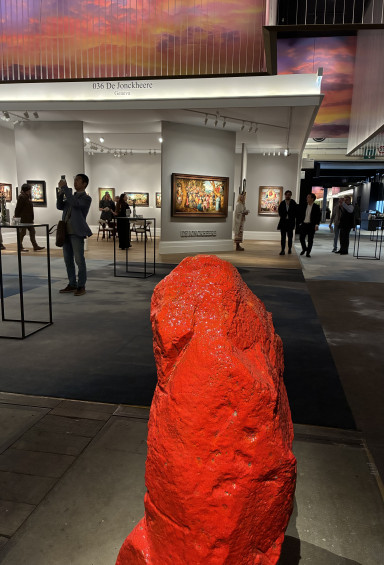

Stephan
Zilkens
,
Zilkens' News Blog 5 2026
If you haven't yet had the opportunity to hear Stefan Kobel speak rather than just read his work, now is your chance: WDR 3 broadcast a discussion programme entitled ‘Moon prices and millions in losses: the art market in crisis’, moderated by Peter Grabowski and featuring Kobel, Nadine Oberste-Hetbleck from ZADIK, Isabel Apiarius-Hanstein from Kunsthaus Lempertz and Rupert Pfab from the gallery of the same name. Fifty enlightening minutes – definitely worth listening to!
But it's not just galleries in German-speaking countries that are struggling with politics – in Spain, the socialist government is refusing to reduce the VAT rate on art from the current 21% to a tolerable European level, even though it has the opportunity to do so. As a result, many galleries are going on strike from 2 to 7 February and foregoing sales. It is not known whether they will lock out their employees in order to exert additional pressure. In Germany, the artists' social security fund remains a nuisance, and not only for galleries. Self-employed graphic designers, writers and freelance cultural workers in general trigger payments to the artists' social security fund from their clients. As a rule, entrepreneurs develop their own pension provision policies – but for art-related activities, the rules are different, and for galleries this means a cost burden of almost 10% of their remaining sales. 100% of the sales price minus 50% for the artist is the basis for the burden on galleries. The levy is calculated on the purchase price. And then the gallery's costs are deducted. For many galleries in Germany, it is difficult to achieve an annual profit of more than EUR 50,000, as Hergen Wöbken found in his study. Fortunately, idealists are not dying out (yet).
Now, Dutch state liability has taken a serious hit. It had to fork out EUR 5.7 million for the theft of Romanian gold objects because it originally wanted to save on premiums. Since 1989, it has been very fortunate, as there have been few incidents for which the state would have been liable. Considering that state liability insurance could be placed on the market for perhaps €9,000, premiums could have been paid for 633 years. Nothing beats cheap insurance – this also applies to state liability constructs – especially since, despite all the doom and gloom in many segments, insurance values are rising (and premium rates are falling proportionally).
Authorities and contradictions among groups acting together: In Minneapolis, shooting-happy ICE officers protect each other, and the Department of Homeland Security makes untenable claims that are proven absurd by video evidence. Crown jewels are stolen from the Louvre, and the security team claims they had to protect visitors, which is also not supported by video evidence. Many will probably say that state-authorised murderers cannot be mentioned in the same breath as poorly paid museum guards. Unfortunately, when it comes to the core behaviour of providing mutual alibis, they can.
Mercosur would be a great ray of hope for a stronger Europe. In the country with the largest population and the largest economy in Europe, there is a political firewall that the Greens have now torn down by voting with the AfD in the European Parliament – everyone is talking about it! But even the Left, which never misses an opportunity to uphold the firewall morally, voted with the far right – but strangely enough, no one is talking about that.
Claas Kleyboldt died in Cologne on Thursday night at the age of 88. Without him, art insurance would probably not exist as an independent business area within insurance companies. He was CEO of Nordstern Versicherungen when the idea of establishing a separate division for art within an insurance company was conceived in 1982. Initially smiled at by the market, he ensured that a new professional field developed for art historians – based on the motto: it is easier for people who understand art to learn about insurance than vice versa. In the second year of the young venture, a Picasso fell from a mantelpiece onto a candle and ate up more than half of the annual premium acquired up to that point. In many companies, this would have meant the end of the experiment. Not so under Kleyboldt: he sought and found Stephan Waetzoldt, who had just retired from the Prussian Cultural Heritage Foundation, someone who contributed many important ideas and enthusiasm to the development of art insurance. Even when Nordstern ended up as a part of AXA as a result of mergers, the art business within this group was initially continued under the Nordstern brand and then developed into AXA ART, the only unit within the group that was not managed from Paris. Kleyboldt was chairman of the supervisory board of the German AXA Group until 2007 and subsequently became its honorary chairman. Among his many other activities, he was also involved in promoting highly talented young people and provided the Matthias Kleyboldt Foundation with start-up capital for this purpose. His memory will live on in this idea as well. We mourn with his family.
Stephan Zilkens and the team at Zilkens Fine Art Insurance Broker GmbH in Solothurn and Cologne
automatically translated
